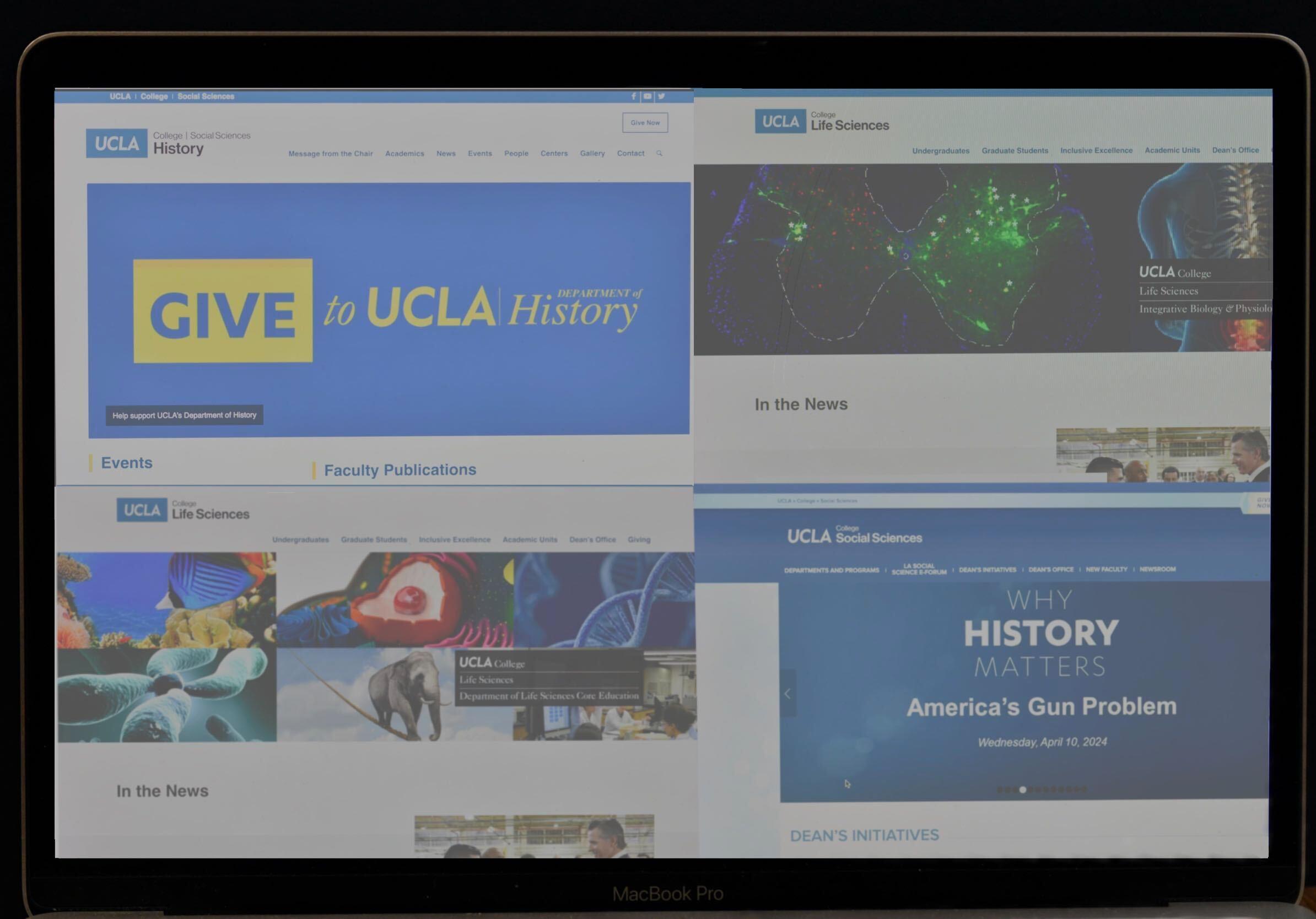UC Regents votes to pass Item J2 following months of revision and deferred voting
Several UCLA departmental websites are pictured. The UC Board of Regents voted to approve Item J2, a policy that prohibits University departments from making political statements on their website homepages, on July 17.
(Photos by Mia Tavares/Daily Bruin senior staff. Photo illustration by Mia Tavares Daily Bruin senior staff)
By Alexandra Crosnoe
July 17, 2024 1:46 p.m.
This post was updated July 21 at 8:25 p.m.
The UC Board of Regents voted to approve Item J2, a policy that prohibits University departments from making political statements on their website homepages.
Item J2, initially proposed by Regent Jay Sures in January as Item J1, mandates that only information pertaining to University operations may appear on departmental website homepages. However, it allows department members to post political opinions on their personal webpages or social media accounts.
“The University affirms the right of academic freedom while also fostering an inclusive environment,” the policy said. “However, individual or group statements on political or controversial issues that are posted on Units’ websites and are unrelated to the Unit’s day-to-day operations are likely to be interpreted by the public and the community as the University’s institutional views.”
The regents were scheduled to vote on the measure during their March and May meetings, but the votes were deferred to subsequent meetings. Sures said that following the March regents’ meeting, the UC Academic Senate reviewed and made recommendations on the policy, which were then used to revise it.
These revisions included clarifying that statements regarding a department’s academic endeavors do not fall within the definition of discretionary statements, Sures added. Additionally, the board stated in the revised policy that departments can link discretionary statements to their homepages.
“This new document, I truly believe, is a better policy,” Sures said. “It reflects that we value academic freedom, and it provides a very inclusive environment for the individual departments to put out statements.”
The item has been criticized by certain faculty members and students, who claim the policy stifles free expression. Several people spoke against the policy during public comment.
[Related: UC Board of Regents Item J1 elicits mixed reactions from UCLA faculty]
Namrata Deepak, a student at UCLA, said she had concerns about the chancellors of UC campuses enforcing J2 and urged the regents to revise the policy.
She added that she no longer trusts that UCLA’s administration makes decisions in the best interests of its students and faculty after ordering the forceful sweep of the Palestine solidarity encampment April 30.
“A major concern I have regarding this policy is leaving the implementation and interpretation up to the chancellors of our respective universities,” she said. “The administration of UCLA has broken the trust of me and countless other students after allowing and ordering violence against peaceful student protesters.”
Ronald Cruz, a member of By Any Means Necessary – an organization seeking “equality by any means necessary” – said Item J2 was a “censorship proposal” and claimed the policy sought to silence faculty members speaking out in support of Palestine.
“It is an attack on academic freedom and freedom of speech,” he said. “If adopted, it will not silence the mass anti-war movement that defied Chancellor Block.”
Nine chapters of Faculty for Justice in Palestine across the UC also criticized the board’s decision to pass Item J2 in a Thursday press release, calling the policy an “attack on free expression.”
FJP members across the UC further alleged in the press release that the policy was implemented to censor pro-Palestine speech in particular, citing that the University did not seek to limit political statements on faculty websites when they were related to the Black Lives Matter movement or the DREAM Act – proposed legislation to grant residence to undocumented immigrants who came to the United States as minors.
“This is another step towards authoritarianism at California’s leading research universities,” said Graeme Blair, a member of FJP at UCLA, in the press release. “The new rules will muzzle scholars, who are meant to use their expert knowledge to contribute to public debates and public policy.”
However, during deliberation of the policy, Regent Richard Leib said the policy would be “content-neutral.” He added that he found it “embarrassing” for members of the community to look at university department websites and mistakenly believe that posted political statements represent the stances taken by the University as a whole.
“If the economics department put MAGA stuff on its website, it’s the same deal,” he said. “It’s a content-neutral situation.”
Despite opposition, Regent Sures said he was confident that other universities would soon adopt J2 after seeing the UC pass the measure.
“What you will see is other universities look at this policy and start implementing it,” he said. “From the folks that have reached out to me, I have heard very positive feedback.”
Contributing reports by Dylan Winward, News editor.
